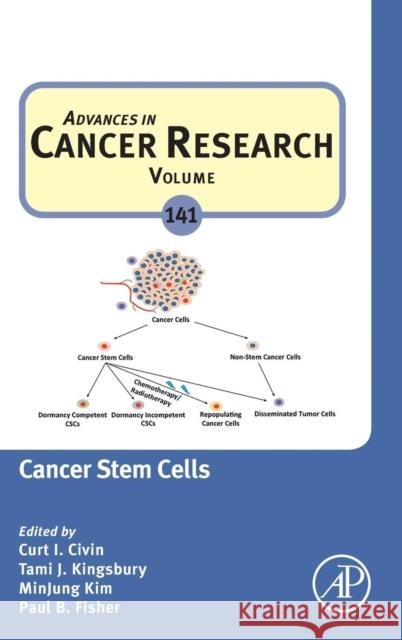Cancer Stem Cells: Volume 141 » książka



Cancer Stem Cells: Volume 141
ISBN-13: 9780128149942 / Angielski / Twarda / 2019 / 267 str.
Cancer Stem Cells: Volume 141
ISBN-13: 9780128149942 / Angielski / Twarda / 2019 / 267 str.
(netto: 625,04 VAT: 5%)
Najniższa cena z 30 dni: 648,28
ok. 16-18 dni roboczych.
Darmowa dostawa!
1. Regulation of cancer stem cell properties by SIX1, a member of the PAX-SIX-EYA-DACH networkTami J. Kingsbury, MinJung Kim and Curt I. Civin2. Dormancy and cancer stem cells: An enigma for cancer therapeutic targetingSarmistha Talukdar, Praveen Bhoopathi, Luni Emdad, Swadesh Das, Devanand Sarkar and Paul B. Fisher3. Clonal hematopoiesis: Pre-cancer PLUSAlexander J. Silver and Siddhartha Jaiswal4. Assays for functionally defined normal and malignant mammary stem cells Syed M. Musheer Aalam, Philip A. Beer and Nagarajan Kannan5. Hypoxia-inducible factors promote breast cancer stem cell specification and maintenance in response to hypoxia or cytotoxic chemotherapyLisha Xiang and Gregg L. Semenza6. Exploiting epigenetically mediated changes: Acute myeloid leukemia, leukemia stem cells and the bone marrow microenvironment Aksinija A. Kogan, Rena G. Lapidus, Maria R. Baer and Feyruz V. Rassool
Curt I. Civin, MD, is the Associate Dean for Research and the Founding Director of the Center for Stem Cell Biology & Regenerative Medicine at the University of Maryland School of Medicine. Prior to joining the University of Maryland, Dr. Civin spent 30 years at Johns Hopkins University School of Medicine leading research and clinical pediatric oncology. In addition to holding 27 biomedical patents, Dr. Civin has received wide recognition for his groundbreaking discovery of the CD34 antigen, and isolation of CD34+ stem cells opened entirely new approaches to leukemia treatment and stem cell transplantation. Dr. Civin has lectured around the world, published more than 250 articles and book chapters, received many awards, and served in leadership positions of multiple distinguished committees and editorial boards. Tami J. Kingsbury, PhD, is Assistant Professor of Physiology in the Center for Stem Cell Biology & Regenerative Medicine at the University of Maryland School of Medicine. Dr. Kingsbury has extensive background in genetics and molecular biology. She discovered a novel family of calcineurin regulatory factors (RCANs) conserved from yeast to humans, now implicated in diverse human cancers. She helped develop a functional high throughput screen to identify microRNAs capable of regulating leukemia cell growth and differentiation. Her current research is focused on dissecting the role of the PAX-SIX-EYA-DACH (PSEDN) transcriptional network in leukemias. She is a scientific co-founder of 3DBioWorks, whose goal is to develop 3D bioreactors to grow normal and leukemic stem cells. In 2018 she became leader of CRISPR Services within the University of Maryland Cancer Center Translational Shared Services laboratory. MinJung Kim, PhD, is Research Associate in the Center for Stem Cell Biology & Regenerative Medicine at the University of Maryland School of Medicine. Dr. Kim has broad expertise in cell and molecular biology. Dr. Kim's research focuses on investigating the functional roles of key microRNAs and their target genes in hematopoiesis, especially erythropoiesis, and leukemias. Paul B. Fisher, MPh, PhD, FNAI, Professor and Chairman, Department of Human and Molecular Genetics, Director, VCU Institute of Molecular Medicine Thelma Newmeyer Corman Chair in Cancer Research in the VCU Massey Cancer Center, VCU, School of Medicine, Richmond, VA, and Emeritus Professor, Columbia University, College of Physicians & Surgeons, New York, NY. Dr. Fisher is among the top 10% of NIH funded investigators over the past 35-years, published approximately 625 papers and reviews, and has 55 issued patents. He pioneered novel gene/discovery approaches (subtraction hybridization), developed innovative therapeutic approaches (Cancer Terminator Viruses), presented numerous named and distinguished lectures, founded several start-up companies, was Virginia Outstanding Scientist of 2014 and elected to the National Academy of Inventors in 2018. Dr. Fisher is a prominent nationally and internationally recognized cancer research scientist focusing on understanding the molecular and biochemical basis of cancer development and progression to metastasis and using this garnered information to develop innovative approaches for diagnosing and treating cancer. He discovered and patented novel genes and gene promoters relevant to cancer growth control, differentiation and apoptosis. His discoveries include the first cloning of p21 (CDK inhibitor), human polynucleotide phosphorylase, mda-9/syntenin (a pro-metastatic gene), mda-5 and mda-7/IL-24, which has shown promising clinical activity in Phase I/II clinical trials in patients with advanced cancers. Dr. Fisher alsohas a documented track record as a successful seasoned entrepreneur. He was Founder and Director of GenQuest Incorporated, a functional genomics company, which merged with Corixa Corporation in 1998, traded on NASDAQ and was acquired by GlaxoSmithKline in 2006. He discovered the cancer-specific PEG-Prom, which is the core technology of Cancer Targeting Systems (CTS, Inc.), a Virginia/Maryland-based company (at Johns Hopkins Medical Center) focusing on imaging and therapy ("theranostics) of metastatic cancer (2014) by Drs. Fisher and Martin G. Pomper. He co-founded InVaMet Therapeutics (IVMT) and InterLeukin Combinatorial Therapies (ILCT) with Dr. Webster K. Cavenee (UCSD) (2017/2018).
1997-2026 DolnySlask.com Agencja Internetowa
KrainaKsiazek.PL - Księgarnia Internetowa









